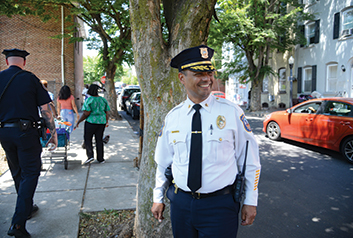Hail to a Trailblazing Chief

Alumnus Wilfredo Campos, a native of Puerto Rico, is Wilmington’s first Latino police chief.
In January, Capt. Wilfredo Campos became the first person of Hispanic descent to be named Wilmington chief of police.
A significant milestone, to be sure. But something almost equally remarkable was overshadowed in the extensive media coverage that followed that announcement: According to Mayor Mike Purzycki, the other candidates for the position said that if they were not chosen, they hoped Capt. Campos would get the job.
This is a phenomenon that, if not unique, is at least extremely unusual in the annals of the working world. Obviously, it speaks to the high regard in which the Wilmington University alumnus is held by his colleagues.
Campos earned that respect during 27 years with the Wilmington Police Department as he moved through various assignments and ranks. He has served in several divisions in the department, including Uniform Services, Community Policing, Criminal Investigation, and Human Resources. He also was a detective, assigned to a Federal Bureau of Alcohol, Tobacco and Firearms Task Force.
A native of Puerto Rico, Campos and his mother, sister and brother moved to Wilmington when he was 8 years old. He grew up on the West Side and attended Thomas McKean High School, where he played shortstop on the baseball team.
After graduating from McKean and attending Delaware Technical Community College for one semester, he was still unsure about his career direction. But there was a military heritage in his family — his father served 17 years in the Army and his grandfather was a Korean War veteran — so he decided to enlist in the Army Reserve. He went to basic training in Fort Sill, Oklahoma, then served four months of active duty.

His military service proved to be a turning point. The Army, Campos says, provided mentoring, structure and guidance. “When I came back, I had a different mindset, and I decided I wanted to go into some type of law enforcement. And what better way to do that than in your own city’s police department.”
The Wilmington Police Department wasn’t hiring at that point, so he took a job at DART. Meanwhile, his father-in-law, Rafael Collazo, a master corporal with the WPD (now retired), gave Campos the condensed version on police work.
“He told me about the job; told me the great things about it and some of the things that are not so great, such as working nights, missing out on birthdays, working holidays, things like that.”
When the WPD began hiring again, Campos applied, was accepted, graduated from the 84th Wilmington Police Academy in 1996, and began patrolling the streets of Wilmington. Like many in law enforcement, he has never fired his weapon, although he says he has drawn it a few times.
He soon recognized the need to further his education, so he went back to DelTech and earned an associate degree in Criminal Justice in 2003. Then he decided to pursue his bachelor’s degree at WilmU, enrolling in the Criminal Justice Program in 2006.
By this time, Campos had risen to the rank of corporal in the Detective Division, and he and his wife, Diana, had two young children. So, he says, “I was a full-time police officer, full-time dad and full-time student.”
Taking classes at night, he graduated in 2008.
“It was a tough two years,” he says, “but I enjoyed it. I enjoyed the interaction with the instructors and the other students. A lot of the instructors had real life experience in the field they were teaching.
“And I liked the small class size. Most of the students were just like me, working-class individuals who were going back to enhance their education. I got to interact with people from different walks of life and different professions — kind of got to share my profession and learn from them also.”
I liked the small class size. Most of the students were just like me, working-class individuals who were going back to enhance their education.
— Wilfredo Campos
Campos has continued his professional education. He’s a graduate of the Senior Management Institute of Policing sponsored by the nationally renowned Police Executive Research Forum, and he is a Polygraph Examiner Professional graduate of the Academy for Scientific Investigative Training in Philadelphia.
While honing his professional skills, Campos also recognizes the importance of police officers being involved with the community. He serves on the board of West Side Family Healthcare and Los Jardines Senior Housing, and he makes every effort to attend police-sponsored activities in the city. That includes the monthly Community Resource Fairs, which bring together police officers and several dozen partners to extend resources to residents, and the Community Outreach Walks — weekly walks with police officers along with public health and social service providers.
His empathy for those in need, he says, has its origin in the aftermath of a fire that displaced his family when he was 12.
As he explained on the WPD website following his appointment as chief: “A house fire destroyed our former home at 6th and Broom streets. We were fortunate to be taken in by a local family, who helped ensure we were never homeless. The kindness of those neighbors and our community has always stuck with me, and I have tried to pay that forward by helping others in my role as a police officer.
“Throughout our city, there are many who are suffering — whether due to drug or substance abuse or dependency issues, mental health needs, or poverty — and we are in a unique position to be able to reach out and help them. Often, it is not a traditional law enforcement response that can best lift these neighbors, but rather it is helping to connect them with the resources and services that can get them back on their feet. I look forward to exploring more ways that our officers can help make these connections.”
In appointing Campos, Mayor Mike Purzycki made note of the new chief’s penchant for getting involved in the community. “His decades-long knowledge and understanding of city neighborhoods and his interactions with city residents will serve him well as he takes command of an outstanding police department,” the mayor said.
As reported in the Wilmington News Journal, Hispanic leaders and community members were pleased with the appointment. “This is huge, and I am ecstatic,” Councilperson-At-Large Maria Cabrera said. “Wilfredo is a good person; he gets along well with people and he’s fair. I think he’s going to get the respect from within that the chief should get.”
I think he’s going to get the respect from within that the chief should get.
— Maria Cabrera
Campos succeeds Robert Tracy, who had been chief since Purzycki took office in 2017 and last year moved on to lead the St. Louis Police Department. During most of Tracy’s tenure, gun violence in the city rose markedly, reaching record levels in 2021 before dropping dramatically last year. In 2022, the WPD recorded a 58% reduction in murders, a 30% reduction in shooting incidents, and significant decreases in most major crime categories.
As Wilmington’s 33rd chief of police, Campos says his first objective is to build on those accomplishments. He credits the 300-plus men and women of the WPD for their work in reducing crime, and he says they will continue to employ evidence-based crime reduction strategies such as CompStat and Group Violence Intervention.
CompStat Methodology Crime reporting involves statistical analysis and information sharing that is now a central component of modern policing. Group Violence Intervention is aimed at preventing crime, replacing enforcement with deterrence, and fostering stronger relationships between law enforcement professionals and the people they serve.
The 50-year-old Campos well knows the challenges facing today’s police officers, who are constantly scrutinized in social media, their actions recorded on cell phones and body cameras. And he welcomes all of it.
“Police work evolves, and we have to evolve with it,” he says. “When you do the right thing a hundred percent of the time, there’s no need to worry about a body camera or somebody filming you. It’s just another tool for us to use, and it’s welcome. It holds everyone accountable, not just police officers but also the public.”
In accepting the job, he stated that he’s both humbled and proud to be the city’s first Hispanic police chief. But he says he feels no pressure because of that distinction. “I want to represent everyone well — the entire city and the police department.”
Though soft-spoken, Campos exudes an unmistakable confidence in his ability to lead the WPD. “I’ve been a policeman now for 27 years,” he says, “so I know my job, and police work is a passion for me.”
— By Bob Yearick



